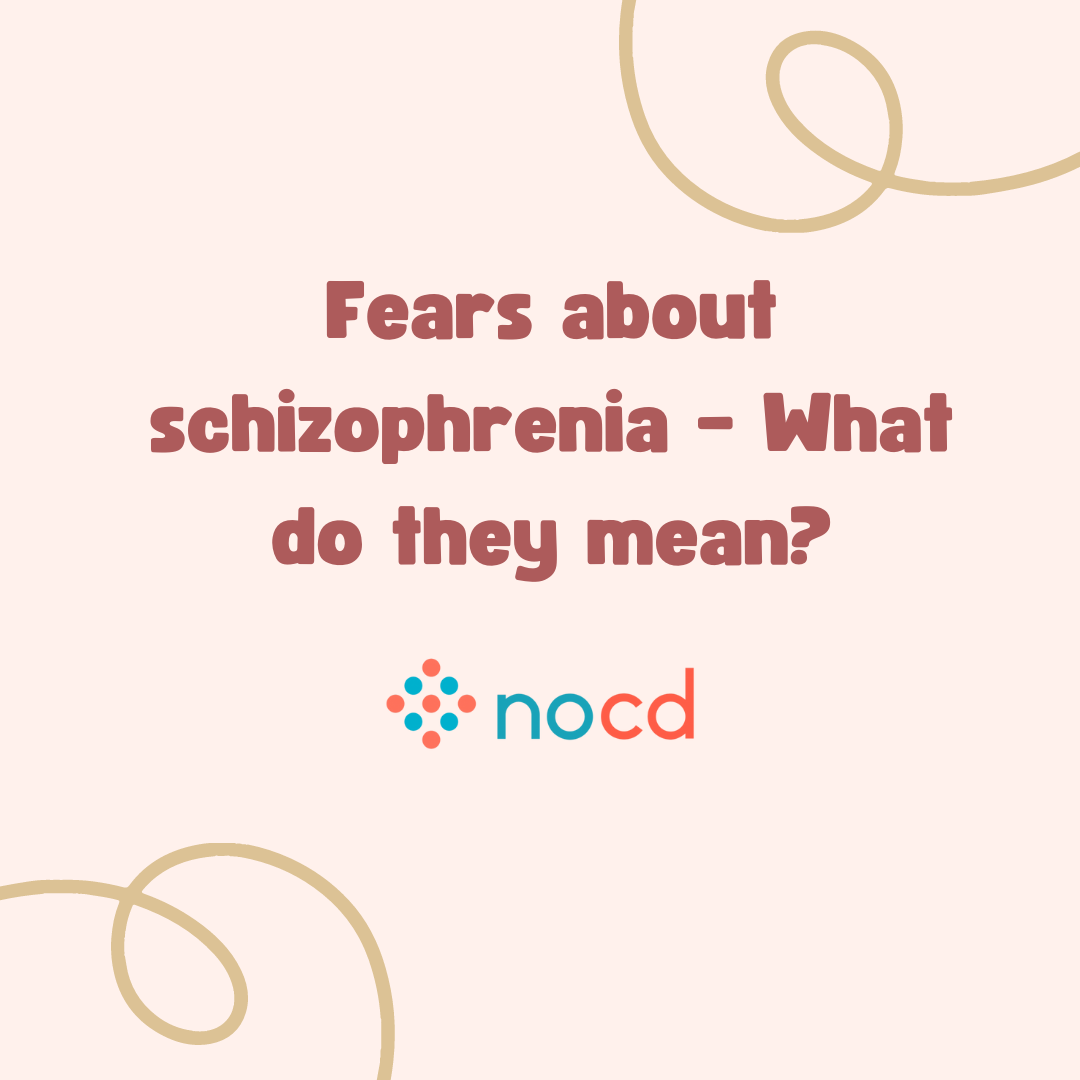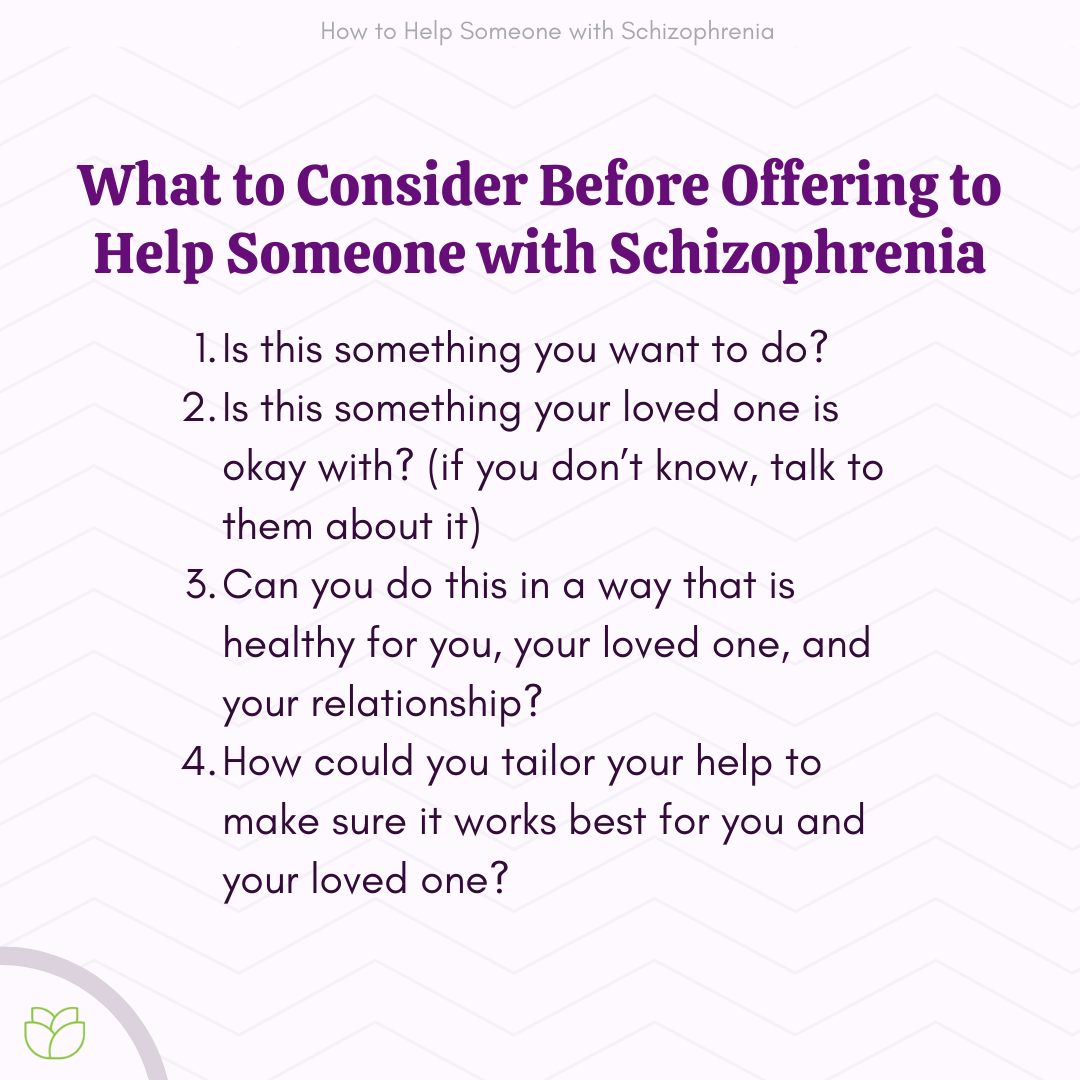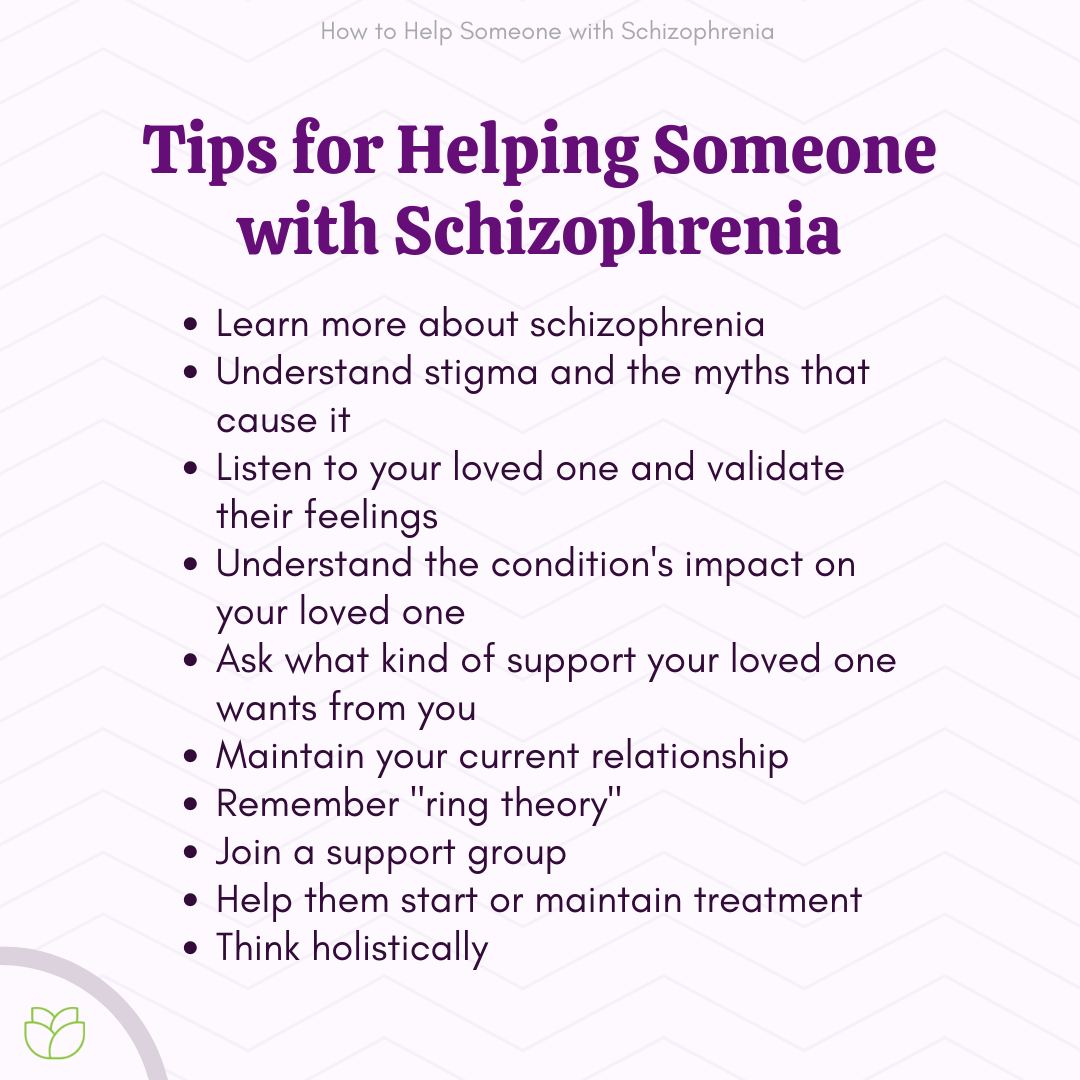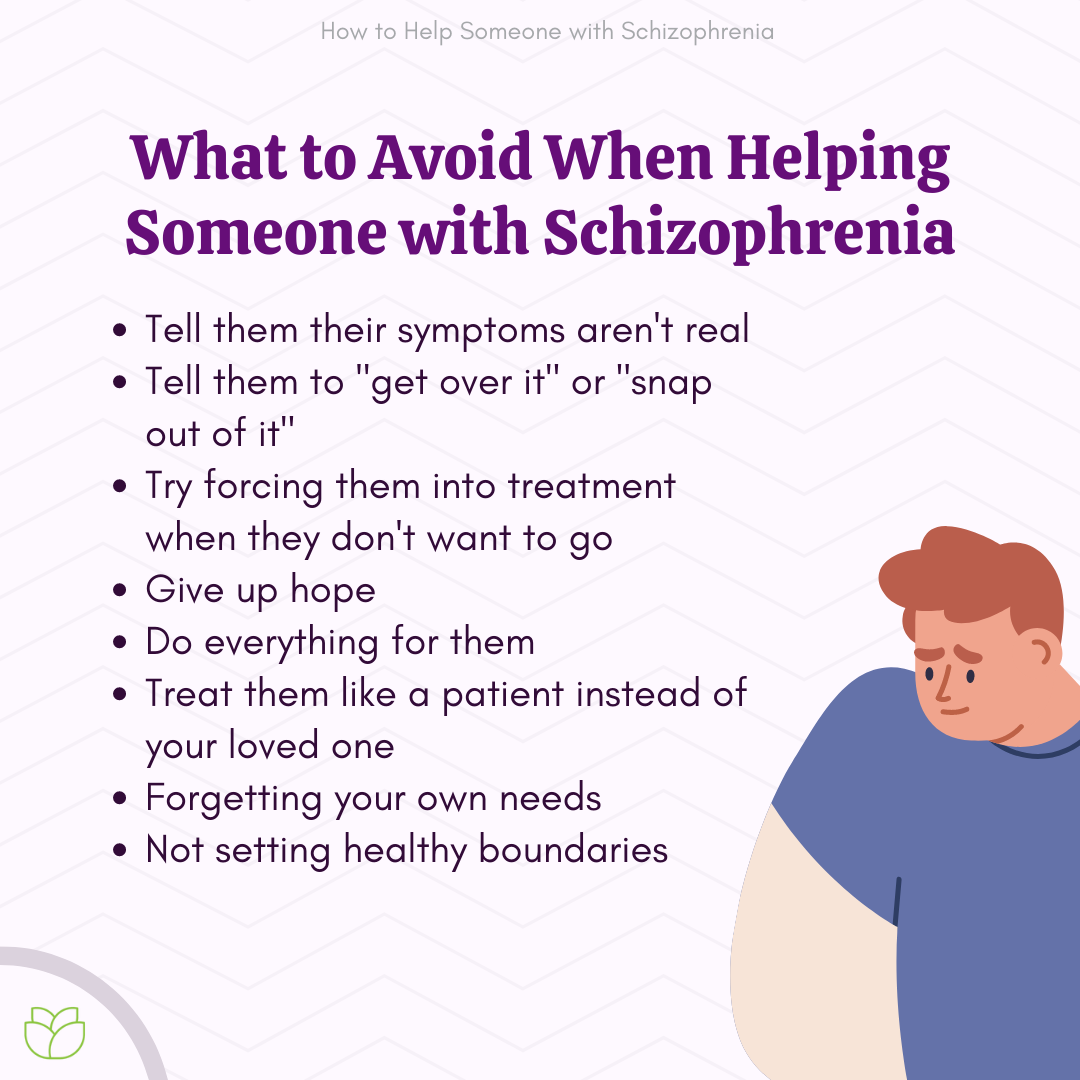
When helping a loved one with schizophrenia, know that maintaining your current, strong relationship by being a consistent and supportive part of their lives is the most important thing you can do. When they cycle through phases of psychosis or negative symptoms, knowing the stability of your presence and care can provide significant comfort.
Schizophrenia Treatment, Covered by Insurance Grow Therapy enables you to find a psychiatrist or psychiatric nurse practitioner who can diagnose your condition, prescribe appropriate medications, and monitor your reaction to medication. Find A Provider
What Is Schizophrenia?
Schizophrenia is a mental illness that impacts about 1% of the population. It is a “psychotic” disorder, so its primary characteristic is that people with schizophrenia have experiences, sensations, and beliefs that are unshared with the general population. There are several other psychotic disorders with similar symptoms, including schizoaffective disorder (which combines symptoms of schizophrenia and mood symptoms).
Symptoms of schizophrenia frequently affect those with the disorder throughout their lives. However, some people experience complete remission, meaning all their symptoms disappear. In addition, many more people experience significant improvements, primarily when provided access to research-supported and person-centered schizophrenia treatments.
Common symptoms of schizophrenia include:
- Hallucinations: Hallucinations are unshared sensory experiences. The person experiencing the hallucination sees, hears, feels, smells, or tastes what others cannot. Common examples include hearing voices and seeing people, animals, or magical or spiritual beings.
- Delusions: Delusions are firmly held beliefs unsupported by facts or objective observations and not commonly shared in one’s culture, community, or religion.
- Negative symptoms: Negative symptoms include difficulty feeling or expressing emotions.
- Disorganized symptoms: Disorganization can refer to chaotic or confused thinking that can cause symptoms like thought blocking, or illogical physical behavior that affects the person’s ability to interact with others or their environment. However, it doesn’t refer to being disorganized in terms of keeping a space clean and organized or maintaining a planner.
- Excited symptoms: These symptoms are also often associated with mania. For example, excited symptoms may include a very elevated mood, high levels of distractibility, and physical hyperactivity.
- Depressive symptoms: These symptoms include low mood, low motivation, loss of interest, and fatigue.
10 Tips for Helping Someone With Schizophrenia
People with schizophrenia frequently experience isolation and loneliness.1 Due to stigma, discrimination, and lack of access to care, it can also be hard for people with schizophrenia to find high-quality treatment. In addition, it can also be challenging to secure other services like supported housing and resources like connections to communities.
Stereotypes associated with schizophrenia make support from loved ones especially important. You can support your loved one with schizophrenia as they figure out how to handle their symptoms and navigate the mental health system. At the same time, you need to ensure that your loved one wants the kind of support you offer and that your help will be healthy and sustainable for you.
Before offering to help someone with schizophrenia, ask yourself:
- Is this something I want to do?
- Is this something my loved one is okay with? (if you don’t know, talk to them about it).
- Can I do this in a way that is healthy for me, my loved one, and our relationship?
- How could I tailor this to help it work best for me and my loved one?
Ten tips for supporting someone with schizophrenia are:
1. Learn More About Schizophrenia
Schizophrenia is a lesser-known and even less understood mental illness, so just reading this article is an excellent start to understanding it better. Learning more about schizophrenia can help you know what your loved one is going through and how you can help.
Many excellent books, articles, and videos from people with schizophrenia and related psychotic disorders can provide insight into the types of support your loved one needs.2, 4, 5
Resources For Schizophrenia
Treatment for Schizophrenia, Covered by Insurance – Grow Therapy enables you to find a psychiatrist or psychiatric nurse practitioner that can diagnose your condition, prescribe appropriate medications, and monitor your reaction to medication. Find A Provider
Schizophrenia Newsletter – Free newsletter from Choosing Therapy for those impacted by Schizophrenia. Get encouragement, tips, and latest info sent twice per week. Sign Up
2. Understand Stigma & the Myths that Cause It
Stigmas, or societally held negative beliefs, are generally common around mental illnesses. Some of the strongest stigmatizing beliefs impact people with schizophrenia. Many people believe those with schizophrenia are dangerous and should not be allowed to live freely. However, people with schizophrenia are more likely to be the victims of violent crime than to harm another person. Damaging stereotypes are one reason why the top three places providing the most mental health care in the United States are all jails: Rikers in New York, Cook County Jail in Illinois, and LA County Jail in California.3
Understanding these stigmatizing beliefs is essential for supporting your loved one. Unfortunately, they are likely to face this stigma. The stigma around their condition will make getting quality mental health and physical health care harder, and they may face discrimination in employment and housing, among other areas. If you can become a myth-busting advocate for people with schizophrenia, your loved one will have a better community.
3. Listen to Your Loved One & Validate Their Feelings
Your loved one has probably been through a lot due to their symptoms and how others respond to them. They have probably already experienced stigma and may expect you to be wary, judgmental, scared, or hostile toward them.
These challenges make it essential to listen to them before offering advice or taking action. Spend quality time with them to understand how they are doing and help them feel comfortable opening up to you. Once they do, just listen and validate their feelings.
4. Understand the Impact on Your Loved One
Understanding how your loved one feels about what they’re going through is critical to supporting them. They face not only difficult symptoms but also the fallout from those symptoms. Many people with schizophrenia experience a range of negative impacts because of how drastically their lives and experiences changed after their symptoms began.
Many people report feeling like they don’t know who they are anymore. People who experience inpatient hospitalization may feel traumatized, or like they’ve lost control of their lives. Often, those with schizophrenia grieve the loss of the lives they expected or planned for. This grief is especially common for those whose symptoms begin as young adults. Their schizophrenia symptoms may force them to take leave from college or other key life experiences. These feelings can make engaging in treatment feel like closing the door on who they were.
5. Ask What Kind of Support Your Loved One Wants From You
Sometimes we try to guess what our loved ones want and need, but it’s best to just talk to them and ask. What they may require could vary widely depending on many factors, including who your loved one is, how they want to approach their mental illness, your relationship with them, and so on. Some people may be glad for you to help them with their treatment; for example, by scheduling or going with them to those appointments. Others may want to handle that independently and prefer you support them by listening or keeping things as “normal” as possible so their whole lives aren’t about being a “patient.”
6. Maintain Your Current Relationship
Regardless of your involvement in your loved ones’ treatment, don’t forget to invest in your current relationship. Whether you are a parent, child, sibling, partner, friend, or something else, maintain the fun, non-mental illness-related, and reciprocal parts of that relationship. If you used to go to the movies together, or play basketball, keep doing it! If your loved one used to copy-edit your writing or help you care for your pets, don’t stop asking them to (unless they opt out or it’s otherwise clear they can’t do it right now).
7. Remember “Ring Theory”
Ring Theory refers to the idea that with challenging situations, there is one person or a group of people in the center who are the most impacted by the situation, and then several “rings” outside of that representing each group that is the next most affected. Ring Theory states that we should bring support and comfort inwards: so if we’re not in the center, we support people who are further in and do not expect them to support us. However, we ask for support from others who are on rings further out from ourselves.
Your loved one is the most impacted by their mental illness, so they are in the center of the ring. Therefore, your role is to support them. However, you are still impacted and also need support. If you talk about your concerns for your loved one, speak with someone who is on a ring further out from you.
8. Join a Support Group
It’s not uncommon for family, friends, and other loved ones of people with mental illness to need some support and want to talk to others who are going through something similar. There are support groups for people in this situation, both online and in person (depending on your location). You can find a support group online or through an online therapist directory.
Schizophrenia Treatment, Covered by Insurance Grow Therapy enables you to find a psychiatrist or psychiatric nurse practitioner who can diagnose your condition, prescribe appropriate medications, and monitor your reaction to medication. Find A Provider
9. Help Them Start or Maintain Treatment
If your loved one wants your support to start or maintain treatment, there are many ways you can do this. Many people find it helpful to have some help, especially when first getting engaged in care or making big changes. It may also be helpful to have you to talk to about treatment options to ensure that the care your loved one engages in makes sense for them.
There are various treatments for schizophrenia, including medication, individual therapy, group therapy, supported education and employment, and peer support. If possible, seeing an expert in schizophrenia and psychosis is ideal. In addition, specialty programs integrate these different treatments all in one place, making things less complicated for your loved one to navigate and more effective because everything is coordinated.
If they were only recently diagnosed, these integrated programs are usually called a First Episode Program (FEP) Coordinated Specialty Care (CSC). However, if they have had schizophrenia for a while, these programs go by several names, including psychiatric rehabilitation, certified community behavioral health clinics (CCBHC), and assertive community treatment (ACT).
10. Think Holistically
Recovery isn’t just about formal treatment. It’s also about creating a whole life that supports health, happiness, and personal meaning. Supporting your loved one can mean helping them think about what they want their life to look like now that they’re experiencing these symptoms and keeping them in activities supporting their overall wellness.
That might include exercising for mental health, self-care, engaging in social and community activities, getting out into nature, and investing in cultural and spiritual practices that are important to your loved one.
What to Avoid When Supporting Someone With Schizophrenia
If your loved one recently began experiencing symptoms, this will likely be an adjustment for both of you. You may find yourself also going through a period of grief as you adjust. It’s totally okay to feel sad, angry, overwhelmed, or anything else you might be feeling. However, it’s important to avoid blaming your loved one for these changes or expecting them to support you. Instead, get lots of outside support and figure out how to help your loved one healthily and sustainably.
Things to avoid when helping someone with schizophrenia include:
- Tell them their symptoms aren’t real: This is invalidating and unhelpful. It will likely make your loved one feel more alone.
- Tell them to “get over it” or “snap out of it”: This is also invalidating and unhelpful. Your loved one did not choose to experience these symptoms.
- Try forcing them into treatment when they don’t want to go: It’s very hard to benefit from care when you don’t want to. This is more likely to reduce their willingness to give treatment a real shot than be helpful.
- Give up hope: People with schizophrenia do get better. Even among people who continue to have significant symptoms, it’s totally possible to have a joyful and meaningful life.
- Do everything for them: It’s important for any person to maintain independence to the extent possible. Help your loved one by empowering them.
- Treat them like a patient instead of your loved one: Your loved one is the same person. Help them enjoy a full life that isn’t just about being “sick.”
- Forgetting your own needs: You can’t help another person if your gas tank is empty. Make sure to take care of your mental and physical health.
- Not setting healthy boundaries: It’s crucial for you and your loved one that your relationship is healthy and sustainable. That requires good boundaries, even if that means not doing some things they might ask for or that you think they need.
When to Intervene
Family members and other loved ones often ask: “How can I get my loved one into care?” The general answer is: you can’t. People get to choose whether or not they engage in mental health care.
In rare situations, a person can be held involuntarily in a hospital for safety. A hold typically lasts 48 or 72 hours in the United States, depending on the state. The hold can be lengthened if necessary. An involuntary hold either requires a person be actively suicidal or considered “gravely disabled,” to the point that they cannot maintain their health and safety. If you believe one of these to be the case, seek immediate medical intervention.
In My Experience
In my experience, people with schizophrenia just want their loved ones to remain present in their lives and support them as they go through something difficult and hard to understand. It is common for those with schizophrenia to lose contact with loved ones who don’t know how to handle their mental illness or believe them to be dangerous. Love, support, and understanding go a long way. If you want to support your loved one but don’t know how, or it’s hard for you, I recommend a support group. I have led these groups as a therapist and find that family members and loved ones are enormous support systems and resources to each other.
Additional Resources
To help our readers take the next step in their mental health journey, Choosing Therapy has partnered with leaders in mental health and wellness. Choosing Therapy is compensated for marketing by the companies included below.
Treatment for Schizophrenia, Covered by Insurance – Grow Therapy enables you to find a psychiatrist or psychiatric nurse practitioner that can diagnose your condition, prescribe appropriate medications, and monitor your reaction to medication. Find A Provider
Talk Therapy – BetterHelp has 25,000+ licensed therapists who provide convenient and affordable online therapy. BetterHelp starts at $65 per week. Visit BetterHelp
Schizophrenia Newsletter – Free newsletter from Choosing Therapy for those impacted by Schizophrenia. Get encouragement, tips, and latest info sent twice per week. Sign Up
Fears about schizophrenia – What do they mean? If you’re experiencing unwanted thoughts about losing your mind, becoming psychotic, or developing schizophrenia, it may actually be a sign of OCD more specifically health concern OCD. You might find yourself constantly questioning the state of your mind, which can cause you to be overly focused on feeling different than usual.









